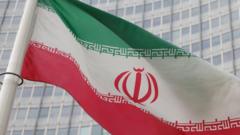In a significant turn of events, the International Atomic Energy Agency (IAEA) has determined for the first time in two decades that Iran is failing to meet its obligations under the nuclear non-proliferation treaty. This resolution from the IAEA's board of governors could potentially lead to a referral to the UN Security Council, increasing diplomatic tensions. The IAEA's recent report cites a notable lack of cooperation from Iran and expresses worry over undisclosed nuclear activities and materials in scrutinized locations.
Iran's Nuclear Compliance Under Scrutiny: IAEA's Warning Marks a Historic Shift

Iran's Nuclear Compliance Under Scrutiny: IAEA's Warning Marks a Historic Shift
The International Atomic Energy Agency's recent findings underscore Iran's non-compliance with nuclear obligations, raising international concerns.
Iran's foreign minister has expressed strong opposition to the resolution passed by European powers, warning them that their support would have serious repercussions. The situation complicates ongoing negotiations between the United States and Iran regarding a renewed nuclear agreement. In light of escalating tensions, the U.S. has recently advised citizens to leave the Middle East due to possible military actions against Iranian nuclear sites.
Iran maintains that its nuclear endeavors are for peaceful purposes and firmly denies any ambitions to develop nuclear weapons. Under the 2015 nuclear accord with multiple powers, Iran agreed to curtail its nuclear program and provide the IAEA with expanded access in exchange for sanctions relief. However, the U.S. withdrawal from the pact in 2018 under President Trump's administration and the re-imposition of sanctions have led Iran to progressively violate the agreement.
The latest findings from the IAEA reveal that Iran has amassed over 408 kilograms (approximately 900 pounds) of uranium enriched to 60% purity, perilously close to weapons-grade levels. This amount could be sufficient to produce nearly nine nuclear bombs, raising significant alarm within the international community regarding Iran's nuclear trajectory.
Iran maintains that its nuclear endeavors are for peaceful purposes and firmly denies any ambitions to develop nuclear weapons. Under the 2015 nuclear accord with multiple powers, Iran agreed to curtail its nuclear program and provide the IAEA with expanded access in exchange for sanctions relief. However, the U.S. withdrawal from the pact in 2018 under President Trump's administration and the re-imposition of sanctions have led Iran to progressively violate the agreement.
The latest findings from the IAEA reveal that Iran has amassed over 408 kilograms (approximately 900 pounds) of uranium enriched to 60% purity, perilously close to weapons-grade levels. This amount could be sufficient to produce nearly nine nuclear bombs, raising significant alarm within the international community regarding Iran's nuclear trajectory.



















